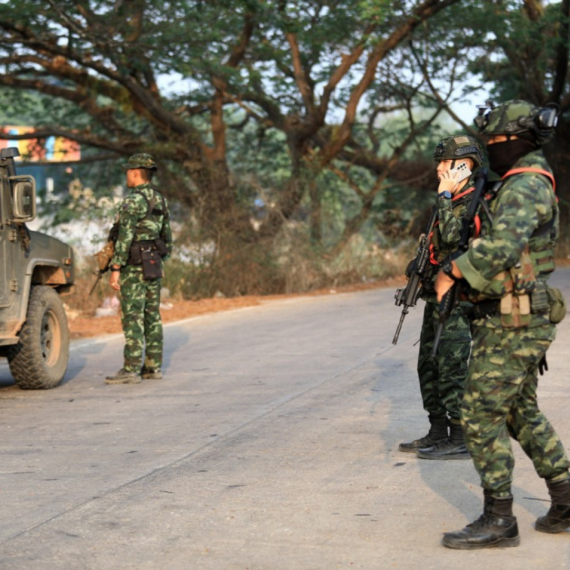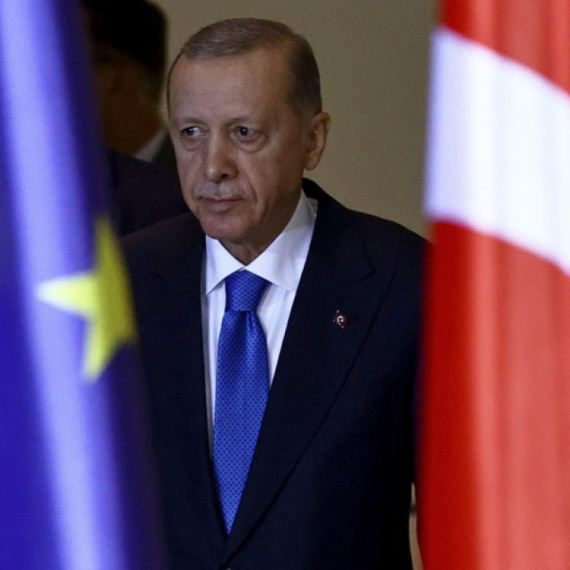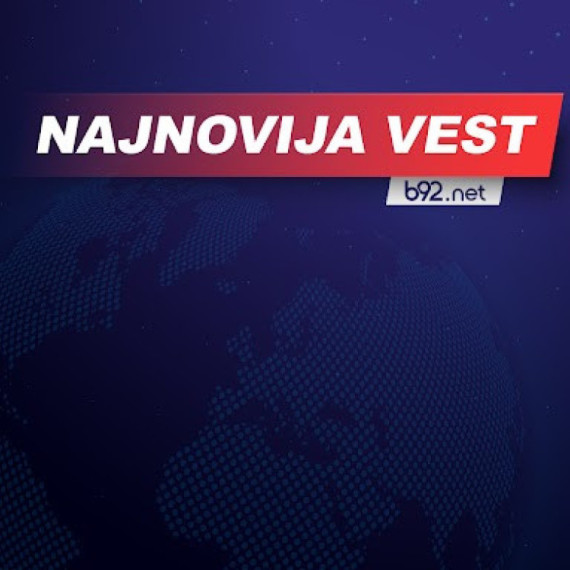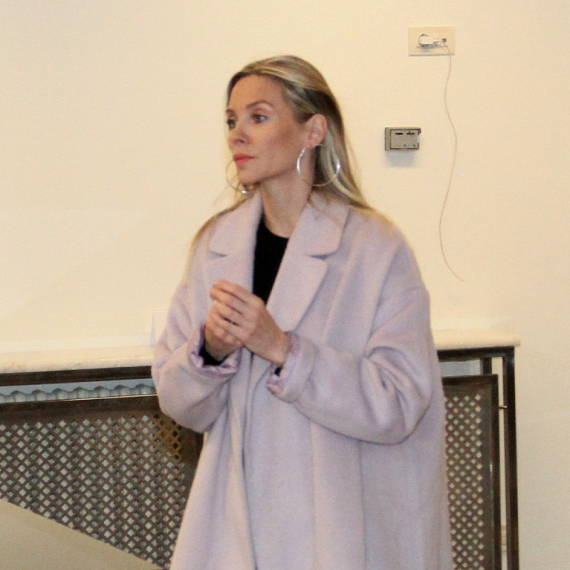"Compromise key to prosperous Balkans"
FM Vuk Jeremić says a mutually acceptable solution for Kosovo’s future status is a prerequisite for a democratic, stable, secure and prosperous Balkans.
Wednesday, 11.06.2008.
09:42

FM Vuk Jeremic says a mutually acceptable solution for Kosovo’s future status is a prerequisite for a democratic, stable, secure and prosperous Balkans. "An acceptable solution to Kosovo's future is the sine qua non of a democratic, stable, secure, prosperous and integrated Balkans—one where the rule of law reigns supreme, reconciliation is achieved, and the values and treaties that bind us together are fully respected," Jeremic said at a roundtable organized by the Magna Carta Foundation in Rome. "Compromise key to prosperous Balkans" Kosovo’s unilateral declaration of independence "has inflicted damage on the foundation of the region's security architecture that we have been working hard to complete. And it has struck at the very heart of the binding principles of the international system—principles such as the respect for states’ territorial integrity, and the inviolability of internationally recognized borders," he said. "As a result, a precedent with global ramifications is being established—one that legitimizes the forced partition of any UN member-state, by supplying any ethnic or religious group with a grievance against its capital with a playbook on how to achieve its ends," the foreign minister said. "I propose that we recall the principles that drive decision-making in Brussels. I'm talking about respect for the rules that frame the choices that can be made, and those that encourage compromise, concession, and consensus-building. "But the rule of law is more than our tradition. It forms the core of our self-understanding as a community of shared values. "What is perhaps less well-known is the Serbian contribution to the promulgation of these values. "In 1349, the Serbian emperor Dusan presented to the nation his Code, in effect Serbia's first constitution. "I want to read to you a passage from it: "Should Our Imperial Majesty write a letter that contravenes this Code and be at odds with the law and justice as set down in the Code, the judges shall not comply therewith, but shall judge and act withal as justice commandeth and shall not judge out of fear of the Emperor. "From time to time it has been remarked that the Balkans are not really a part of Europe, that we are not a part of the mainstream. "So I wanted to take this occasion to remind us all of the fact that Serbia is a sometimes overlooked constitutive element of the European tradition of the rule of law. "And I wanted to express my view that in a European context, the principle that all are equal before the law, once adopted and brought into practice, inevitably leads to the transformation of a given society into a democracy. This, of course, takes time. But we mustn't confuse principle with history. "History has not always been kind to Serbia. Centuries of Ottoman occupation, two Balkan and two world wars, as well as the conflicts of the 1990s, are all a part of our historical record. Equally important was the progressive development of Constitutionalism in the latter half of the 19th and early 20th centuries that sought to establish a kind of continuity of spirit with Dusan's Code—Serbia’s Magna Carta—together with the restoration of democracy that took place at the end of the 20th century. "We have turned the page. The present moment is one of hope, driven by our fundamental commitment to consolidate once and for all the democratic gains we have made in the past eight years. "The moment is one of hope because for us, democracy in the contemporary context is associated with the domestic consolidation of European values. "This explains why the April 29 historic signing of the Stabilization and Association Agreement between the EU and my country is of such importance: it has enabled us to declare that the contours of Serbia's future in Europe have at last been solidly traced. "Our people have spoken: the decisive victory of pro-European forces at the May 11 parliamentary election signals our national confirmation to pursue a political course that rapidly leads to full membership of the European Union. "Today, we have the chance to raise the sights of the Serbian people to a future of stability, security, and prosperity. "And it is to this future that I wish to direct the remainder of my remarks to you this evening. "What should we seek to accomplish? What is it in our interest to prevent? These are the two questions that have served as the basis for strategic thinking of European statesmen for a very long time. "In the past, they reflected a zero-sum, balance-of-power approach to international relations that produced too many periods of instability, leading our continent and the world to the brink of disaster. "But in the twenty-first century, asking these two fundamental questions reflects a sober realization that we must build a common future on the strength of what brings us together as a democratic community of nation-states. To construct and to integrate, on the basis of a cornerstone belief in the interdependence of individual liberty human and minority rights, and so to grasp the infinite opportunities that our era offers to the bold, and to the visionary-this is our task, and this is our purpose. "For European democracy is about substance, not just procedures. It is about institutions, not just words on a parchment. And it is about responsibilities, not just rights. "Democracy is also about deepening regional cooperation--a preparatory stage to the comprehensive integration of the Western Balkans into the EU in which each one of our countries will be able to safely promote their prosperity. "Democracy is also about implementing true, genuine reconciliation--to the benefit of the generations to come, in the name of those who are with us no longer. "At the heart of this absolute commitment to reconciliation lies full cooperation with the International Criminal Tribunal for the former Yugoslavia. "Let there be no doubt, Serbia remains determined to locate, arrest, and hand over the few Hague fugitives still at large. And we will succeed. I am sure of it. Cooperation with the Hague is not only our undeniable international obligation; it is our moral duty to our neighbors and the world, of course, but foremost to ourselves. "The moral dimension of reconciliation is central to building a truly European Balkans, for it provides a framework through which the crimes of individuals who falsely acted in the name of their nation are to be understood, while enabling regional cooperation—a prelude to Europe—to both broaden and deepen. "This truly historic sense of European purpose is being tested by the events that have arisen as a result of the unilateral declaration of independence (UDI) by the assembly of the self-government provisional institutions of our southern province of Kosovo in clear violation of the United Nations Charter, in contravention of Security Council Resolution 1244, and in opposition to the Helsinki Final Act. "I must be frank with you: the decision to recognize the UDI by the previous Italian government has disturbed our flourishing bilateral relationship. "Was it not in our interest to prevent this? For our political and economic ties were assuming, I think you will agree, the form of a strategic partnership—let me refer only to the most recent decision by Fiat to invest in the Zastava car plant in the Serbian city of Kragujevac. "And every indication suggested that they were getting even closer, for the Italian Republic traditionally understood Serbia’s European character. Your country has, after all, been one of the most active advocates of Serbia's accelerated progress towards full EU membership. "How do we move forward in this complicated set of circumstances? "How, in other words, do we overcome the erroneous choice to sacrifice the region's 21st century geo-strategic priorities on the altar of maximalist, 19th century communal aspirations? "And I propose that we make a concerted effort to realign our behavior in accordance with the standards of the international system built on the foundation of the United Nations Charter. "These standards were first brought forth when the Magna Carta was promulgated and the rule of law was established as a principle of conduct amongst Europeans. "Its strategic aim was regulatory, after all. By seeking to eliminate the arbitrary use of power through the imposition of a compulsory code of conduct, it clearly defined the scope of legitimate behavior. "The same is said of the international system established by the UN Charter. The same principles are at work: binding obligations, rule of law, sovereign equality. "That is why one can say that the United Nations Charter is the Magna Carta of the world community. "In line with our commitment to the peaceful resolution of Kosovo's future status and the values of the EU we are on course to join, as well as our determination to respect the rule of law in the international arena, the Republic of Serbia has ruled out the use of force. "Instead, we will proceed with the formulation of creative proposals designed to legalize the international civilian presence and break the status deadlock. "And we will present them to our partners and friends with a view to re-opening the window of opportunity for good faith negotiations to take place and continue until compromises are reached—compromises that all legitimate stakeholders can abide by, and that are confirmed by the United Nations Security Council, the ultimate upholder of the rule of law in the international system. "I have tried to present to you my vision of Serbia's future and how to attain it, my thoughts on regional cooperation and how to promote it, and my vision of Europe and how to achieve it. "Finally, I would like to re-emphasize the crux of the matter. "This is a time for sober strategic thinking and prudential statecraft, and a time to look past the divisions. It is time to face forward, to gaze beyond the discord, and to find a European solution to the European challenge that is Kosovo's future status. "To act withal as justice commandeth," says the Code of Dusan. "To act within the law, and strengthen the international system. This is our solemn duty; it is what we should seek to accomplish. "It will not be easy. But it is necessary. "There is no other workable way forward. "And so I believe that in the weeks and months ahead, we will all have to take historical steps designed to move beyond the vicious circle of unilateral actions that have unnecessarily complicated the situation. "I believe we can do it, because I believe in the power of the ideas that have brought us this far, to within sight of the finishing line," Jeremic concluded. Vuk Jeremic (FoNet, archive)
"Compromise key to prosperous Balkans"
Kosovo’s unilateral declaration of independence "has inflicted damage on the foundation of the region's security architecture that we have been working hard to complete. And it has struck at the very heart of the binding principles of the international system—principles such as the respect for states’ territorial integrity, and the inviolability of internationally recognized borders," he said."As a result, a precedent with global ramifications is being established—one that legitimizes the forced partition of any UN member-state, by supplying any ethnic or religious group with a grievance against its capital with a playbook on how to achieve its ends," the foreign minister said.
"I propose that we recall the principles that drive decision-making in Brussels. I'm talking about respect for the rules that frame the choices that can be made, and those that encourage compromise, concession, and consensus-building.
"But the rule of law is more than our tradition. It forms the core of our self-understanding as a community of shared values.
"What is perhaps less well-known is the Serbian contribution to the promulgation of these values.
"In 1349, the Serbian emperor Dušan presented to the nation his Code, in effect Serbia's first constitution.
"I want to read to you a passage from it:
"Should Our Imperial Majesty write a letter that contravenes this Code and be at odds with the law and justice as set down in the Code, the judges shall not comply therewith, but shall judge and act withal as justice commandeth and shall not judge out of fear of the Emperor.
"From time to time it has been remarked that the Balkans are not really a part of Europe, that we are not a part of the mainstream.
"So I wanted to take this occasion to remind us all of the fact that Serbia is a sometimes overlooked constitutive element of the European tradition of the rule of law.
"And I wanted to express my view that in a European context, the principle that all are equal before the law, once adopted and brought into practice, inevitably leads to the transformation of a given society into a democracy. This, of course, takes time. But we mustn't confuse principle with history.
"History has not always been kind to Serbia. Centuries of Ottoman occupation, two Balkan and two world wars, as well as the conflicts of the 1990s, are all a part of our historical record. Equally important was the progressive development of Constitutionalism in the latter half of the 19th and early 20th centuries that sought to establish a kind of continuity of spirit with Dušan's Code—Serbia’s Magna Carta—together with the restoration of democracy that took place at the end of the 20th century.
"We have turned the page. The present moment is one of hope, driven by our fundamental commitment to consolidate once and for all the democratic gains we have made in the past eight years.
"The moment is one of hope because for us, democracy in the contemporary context is associated with the domestic consolidation of European values.
"This explains why the April 29 historic signing of the Stabilization and Association Agreement between the EU and my country is of such importance: it has enabled us to declare that the contours of Serbia's future in Europe have at last been solidly traced.
"Our people have spoken: the decisive victory of pro-European forces at the May 11 parliamentary election signals our national confirmation to pursue a political course that rapidly leads to full membership of the European Union.
"Today, we have the chance to raise the sights of the Serbian people to a future of stability, security, and prosperity.
"And it is to this future that I wish to direct the remainder of my remarks to you this evening.
"What should we seek to accomplish? What is it in our interest to prevent? These are the two questions that have served as the basis for strategic thinking of European statesmen for a very long time.
"In the past, they reflected a zero-sum, balance-of-power approach to international relations that produced too many periods of instability, leading our continent and the world to the brink of disaster.
"But in the twenty-first century, asking these two fundamental questions reflects a sober realization that we must build a common future on the strength of what brings us together as a democratic community of nation-states. To construct and to integrate, on the basis of a cornerstone belief in the interdependence of individual liberty human and minority rights, and so to grasp the infinite opportunities that our era offers to the bold, and to the visionary-this is our task, and this is our purpose.
"For European democracy is about substance, not just procedures. It is about institutions, not just words on a parchment. And it is about responsibilities, not just rights.
"Democracy is also about deepening regional cooperation--a preparatory stage to the comprehensive integration of the Western Balkans into the EU in which each one of our countries will be able to safely promote their prosperity.
"Democracy is also about implementing true, genuine reconciliation--to the benefit of the generations to come, in the name of those who are with us no longer.
"At the heart of this absolute commitment to reconciliation lies full cooperation with the International Criminal Tribunal for the former Yugoslavia.
"Let there be no doubt, Serbia remains determined to locate, arrest, and hand over the few Hague fugitives still at large. And we will succeed. I am sure of it. Cooperation with the Hague is not only our undeniable international obligation; it is our moral duty to our neighbors and the world, of course, but foremost to ourselves.
"The moral dimension of reconciliation is central to building a truly European Balkans, for it provides a framework through which the crimes of individuals who falsely acted in the name of their nation are to be understood, while enabling regional cooperation—a prelude to Europe—to both broaden and deepen.
"This truly historic sense of European purpose is being tested by the events that have arisen as a result of the unilateral declaration of independence (UDI) by the assembly of the self-government provisional institutions of our southern province of Kosovo in clear violation of the United Nations Charter, in contravention of Security Council Resolution 1244, and in opposition to the Helsinki Final Act.
"I must be frank with you: the decision to recognize the UDI by the previous Italian government has disturbed our flourishing bilateral relationship.
"Was it not in our interest to prevent this? For our political and economic ties were assuming, I think you will agree, the form of a strategic partnership—let me refer only to the most recent decision by Fiat to invest in the Zastava car plant in the Serbian city of Kragujevac.
"And every indication suggested that they were getting even closer, for the Italian Republic traditionally understood Serbia’s European character. Your country has, after all, been one of the most active advocates of Serbia's accelerated progress towards full EU membership.
"How do we move forward in this complicated set of circumstances?
"How, in other words, do we overcome the erroneous choice to sacrifice the region's 21st century geo-strategic priorities on the altar of maximalist, 19th century communal aspirations?
"And I propose that we make a concerted effort to realign our behavior in accordance with the standards of the international system built on the foundation of the United Nations Charter.
"These standards were first brought forth when the Magna Carta was promulgated and the rule of law was established as a principle of conduct amongst Europeans.
"Its strategic aim was regulatory, after all. By seeking to eliminate the arbitrary use of power through the imposition of a compulsory code of conduct, it clearly defined the scope of legitimate behavior.
"The same is said of the international system established by the UN Charter. The same principles are at work: binding obligations, rule of law, sovereign equality.
"That is why one can say that the United Nations Charter is the Magna Carta of the world community.
"In line with our commitment to the peaceful resolution of Kosovo's future status and the values of the EU we are on course to join, as well as our determination to respect the rule of law in the international arena, the Republic of Serbia has ruled out the use of force.
"Instead, we will proceed with the formulation of creative proposals designed to legalize the international civilian presence and break the status deadlock.
"And we will present them to our partners and friends with a view to re-opening the window of opportunity for good faith negotiations to take place and continue until compromises are reached—compromises that all legitimate stakeholders can abide by, and that are confirmed by the United Nations Security Council, the ultimate upholder of the rule of law in the international system.
"I have tried to present to you my vision of Serbia's future and how to attain it, my thoughts on regional cooperation and how to promote it, and my vision of Europe and how to achieve it.
"Finally, I would like to re-emphasize the crux of the matter.
"This is a time for sober strategic thinking and prudential statecraft, and a time to look past the divisions. It is time to face forward, to gaze beyond the discord, and to find a European solution to the European challenge that is Kosovo's future status.
"To act withal as justice commandeth," says the Code of Dušan.
"To act within the law, and strengthen the international system. This is our solemn duty; it is what we should seek to accomplish.
"It will not be easy. But it is necessary.
"There is no other workable way forward.
"And so I believe that in the weeks and months ahead, we will all have to take historical steps designed to move beyond the vicious circle of unilateral actions that have unnecessarily complicated the situation.
"I believe we can do it, because I believe in the power of the ideas that have brought us this far, to within sight of the finishing line," Jeremić concluded.



























































Komentari 18
Pogledaj komentare